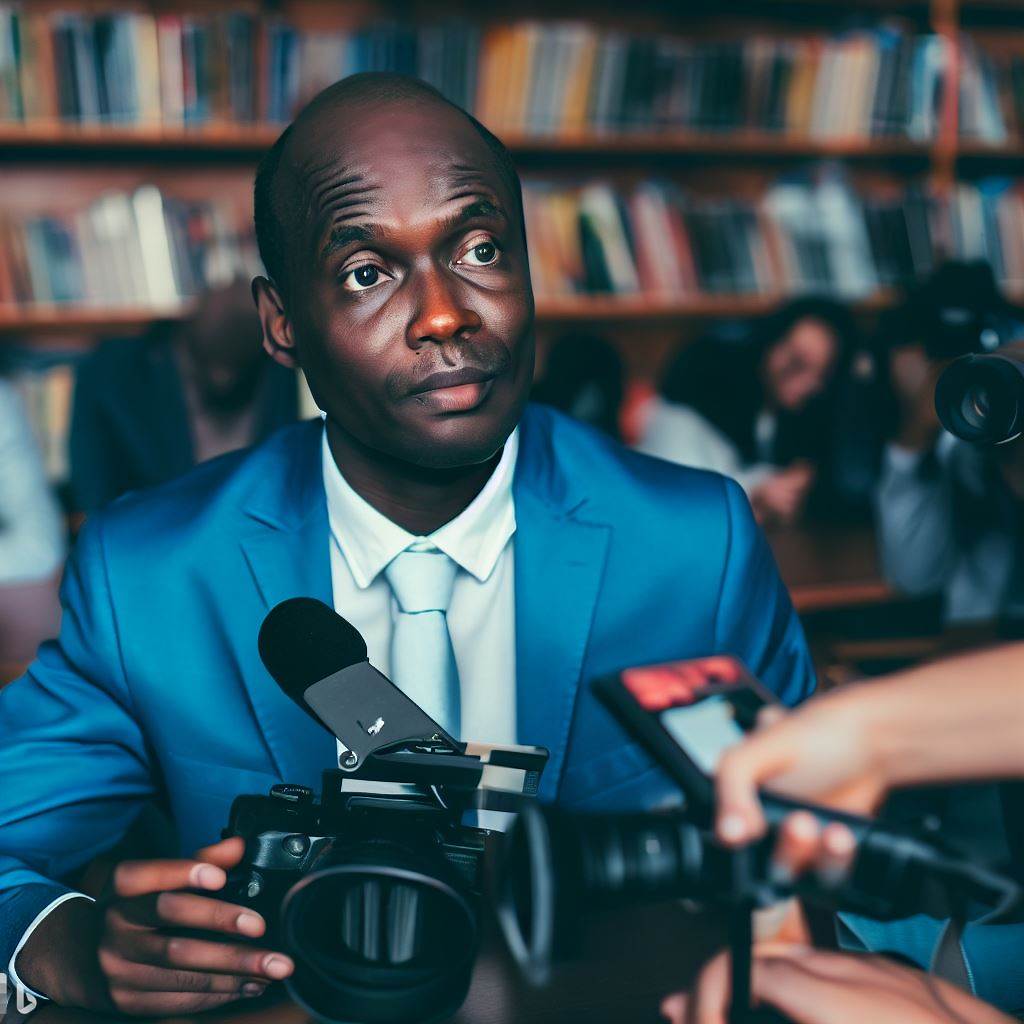How Nigerian Journalists are Shaping Policy
Last Updated on August 29, 2023
Introduction
Policy shaping holds immense importance as it directly impacts the functioning of a society.
It is through policies that governments or organizations establish rules, regulations, and guidelines to achieve specific goals.
These policies affect various sectors such as education, healthcare, economy, and security.
Journalists have a crucial role in policy shaping. They have the power to shed light on important issues, initiate public discourse, and hold policymakers accountable.
Through their investigative journalism, they expose corruption, irregularities, and shortcomings in existing policies.
In Nigeria, the journalism landscape is vibrant and diverse. With a population of over 200 million people, Nigeria has a wide array of media outlets, both print and electronic.
Newspapers like The Guardian, Vanguard, and ThisDay, along with television stations such as Channels TV and NTA, have a significant influence on public opinion.
Nigerian journalists have played an instrumental role in shaping policies.
Their in-depth reporting on topics like corruption, human rights violations, and socio-economic challenges have pushed policymakers to take action.
Journalists often work to amplify marginalized voices and advocate for policies that address the needs of the people.
In short, policy shaping is crucial for the development and progress of a society.
Nigerian journalists have a key role to play in this process, by bringing crucial issues to the forefront and advocating for policies that benefit the nation as a whole.
Their dedication and efforts have the power to shape a better future for Nigeria.
The Influence of Investigative Journalism on Policy Making
A. How Investigative Journalism Uncovers Corruption and Malpractices
Investigative journalism in Nigeria has been instrumental in uncovering corruption and malpractices within various sectors of the country’s policies.
Journalists, who act as watchdogs, delve deep into government institutions and private organizations to reveal illicit activities that negatively impact society.
By actively investigating, gathering evidence, and presenting facts, investigative journalists expose cases of bribery, embezzlement, fraud, and other forms of corruption that erode trust and hinder development.
Their work brings to light the hidden agendas and unethical practices of both individuals and organizations.
Through comprehensive investigative reporting, journalists bring transparency to the public, ensuring that those involved in corrupt acts do not escape accountability.
The focus is on shedding light on wrongdoing, holding wrongdoers responsible, and demanding justice.
B. How Exposing Corruption Leads to Public Outcry and Demand for Policy Changes
When investigative journalists unravel corruption and malpractices, their findings create a ripple effect that ignites public outrage.
These revelations bring to light the extensive damage caused by corrupt individuals and institutions, making citizens aware of the need for change.
The exposés drive public outcry and serve as a catalyst for demanding policy changes that address the identified issues.
Citizens become more informed and empowered to hold their leaders accountable and push for better governance.
The impact of public outcry and demand for policy changes can be seen through increased pressure on government officials to take action against the exposed corruption.
The public’s voice becomes a powerful force that cannot be ignored, leading to reforms and policy adjustments aimed at preventing further malpractices.
C. Prominent Nigerian Investigative Journalists and Their Impact on Policy Making
Several Nigerian investigative journalists have played a pivotal role in shaping policy and effecting change in the country’s governance system.
- Ngozi Nwosu: Nwosu’s extensive investigative research into corrupt practices in the education sector led to an overhaul of the national education policy.
Her work highlighted cases of ghost teachers, misappropriation of funds, and dilapidated infrastructure, forcing the government to prioritize education reforms. - Wole Soyinka: Soyinka’s investigative writings extensively exposed corruption within the judiciary and law enforcement agencies.
His efforts led to a public outcry that demanded a complete overhaul of the justice system, resulting in the establishment of anti-corruption agencies and reforms in legal processes. - Abike Dabiri-Erewa: Dabiri-Erewa’s investigations into human trafficking and illegal immigration prompted the government to enact stricter policies and establish specialized agencies to combat these issues.
Her reporting shed light on the desperation of individuals and the need for comprehensive immigration reforms.
These are just a few examples of Nigerian investigative journalists who have significantly impacted policy making through their dedication and unwavering commitment to uncovering the truth.
In fact, investigative journalism in Nigeria plays a vital role in uncovering corrupt practices and malpractices within policies.
By exposing these issues, investigative journalists spark public outcry and demand for policy changes.
Prominent Nigerian investigative journalists have proven the influence they can wield, driving policy reforms that aim to ensure transparency, accountability, and a better future for the country.
The Role of Opinion Journalism in Policy Shaping
A. Power of opinion journalism in influencing public opinion
Opinion journalism holds significant power because it can shape public opinion, serving as a catalyst for change.
Through powerful narratives, emotional language, and persuasive arguments, opinion journalists can sway public perception towards specific policies.
Opinionated articles can be thought-provoking, challenging prevailing norms, and encouraging dialogue among citizens.
In the age of social media, opinion journalism has gained even more influence, as articles are shared widely, gaining exponential reach.
B. How journalists analyze policy matters and offer alternative perspectives
Journalists play a crucial role in policy analysis by critically examining its various aspects.
They scrutinize the intended goals of a policy, evaluating its potential impact on different segments of society.
By interviewing policymakers, experts, and affected individuals, journalists provide valuable insights and alternative perspectives.
They gather information, analyze data, and present contrasting viewpoints to help the public form educated opinions on policy matters.
C. Notable Nigerian journalists who have influenced policy debates through their opinion pieces
Key Nigerian journalists have played instrumental roles in shaping policy debates through their influential opinion pieces.
Reuben Abati, a former presidential spokesman turned columnist, has raised critical issues and stimulated public debates.
Nduka Irabor, a renowned journalist, has used his column to offer alternative perspectives and challenge popular narratives.
Chidi Odinkalu, a human rights lawyer and writer, has fearlessly addressed social, political, and policy issues through his articles.
These journalists have contributed to public discourse, highlighting policy gaps, and fostering accountability among policymakers.
In essence, opinion journalism wields considerable power in shaping policy by influencing public opinion.
Journalists have the ability to analyze policies, offer alternate perspectives, and hold policymakers accountable.
Notable Nigerian journalists like Reuben Abati, Nduka Irabor, and Chidi Odinkalu have made significant impacts in policy debates through their opinion pieces.
Their thought-provoking articles have contributed to shaping public opinion and urging for better policies in Nigeria.
Read: Mixing Engineer Contracts: Legal Aspects in the Nigerian Context
Journalistic Coverage of Social Issues and Policy Implications
A. The role of journalists in reporting on social issues related to governance and policy
Journalists play a crucial role in reporting on social issues, especially those related to governance and policy.
They have the power to inform the public about the challenges faced by society and the policies put in place to address them.
By actively investigating and presenting these issues, journalists can hold governments accountable for their actions or inactions.
B. How media coverage sheds light on societal challenges and drives policy adjustments
Media coverage serves as a spotlight, shedding light on societal challenges that would otherwise go unnoticed.
Through their reporting, journalists can bring attention to pressing issues such as poverty, unemployment, education, healthcare, crime, and corruption.
By creating public awareness, media coverage can ultimately drive policy adjustments and improvements.
Media coverage often acts as a catalyst for change. Journalists use their platforms to expose the consequences of ineffective policies, sparking public outrage and demanding solutions.
The power of public opinion, influenced by media coverage, can pressure policymakers to implement reforms and make necessary adjustments to existing policies.
C. Examples of Nigerian journalists covering social issues and policy outcomes
Nigerian journalists have been at the forefront of reporting on social issues and their policy implications.
Their investigative reporting has played a significant role in shaping policy outcomes.
For instance:
- Housing Crisis: Journalists like Fisayo Soyombo exposed the dire state of Nigeria’s prison system, leading to policy changes aimed at improving prison conditions and reducing congestion.
- Corruption: Through their investigative reports, journalists such as Kiki Mordi have exposed corrupt practices in various sectors, leading to the prosecution of corrupt officials and the development of anti-corruption policies.
- Education: Media coverage on the state of education in Nigeria, including the poor quality of infrastructure and the high rate of out-of-school children, has led to policy interventions and initiatives to improve the education system.
- Health Care: Journalists like Ruona Meyer have shed light on the challenges faced by Nigerians, such as inadequate healthcare facilities and high maternal mortality rates. These reports have influenced policy changes and the allocation of resources to improve healthcare services.
In these examples, Nigerian journalists have not only highlighted the problems but also provided evidence-based reporting, which has resulted in policy adjustments and positive outcomes.
All in all, Nigerian journalists have a critical role in covering social issues related to governance and policy.
Through their investigative reporting, they hold power accountable and raise awareness among the public.
By shedding light on societal challenges, journalists drive policy adjustments and improvements.
Their work can lead to positive outcomes, such as reforms in the prison system, tackling corruption, improving education, and enhancing healthcare services.
The impact of Nigerian journalists on policy outcomes cannot be underestimated, and their continued dedication to reporting on social issues is vital for the progress of the nation.
Read: A Day in the Life of a Performers’ Manager in Nigeria

The Responsibility of News Journalism in Holding Government Accountable
A. The Duty of News Journalism as a Watchdog Over the Government
- News journalism plays a crucial role in ensuring accountability within the government.
- Journalists act as watchdogs, monitoring the actions of government officials and reporting on their activities.
- The duty of news journalism is to provide the public with accurate and timely information about the government’s actions.
- Through investigative reporting, journalists uncover corruption, fraud, and misconduct within the government.
- By effectively fulfilling their watchdog role, journalists strive to maintain transparency and strengthen democracy.
- News journalism acts as a check on the abuse of power, ensuring that officials are held accountable for their actions.
- Journalists are responsible for asking tough questions, demanding transparency, and holding the government to high ethical standards.
- Through their reporting, journalists expose potential abuse of power and help prevent government overreach.
B. How Journalists Expose Government Inefficiencies and Hold Officials Accountable
- Journalists delve deep into government affairs to uncover inefficiencies, exposing them through their reporting.
- Their work presents a critical analysis of policies, shedding light on gaps, corruption, and mismanagement.
- Investigative journalism uncovers scandals, cover-ups, and embezzlement, ensuring officials are held accountable.
- By holding officials accountable, journalists prompt corrective measures, leading to improved governance.
- Through their reporting, journalists give a voice to marginalized communities affected by ineffective government policies.
- Journalists play a vital role in creating public awareness, rallying support for necessary reforms, and demanding change.
- A free press acts as a watchdog, encouraging transparency and deterring officials from engaging in unethical practices.
- By exposing government inefficiencies, journalists contribute to enhancing public trust and the overall well-being of society.
C. Cases Where Nigerian Journalists Played a Significant Role in Policy Changes
- Nigerian journalists have consistently played a significant role in shaping policy changes throughout the country’s history.
- In 2010, journalists exposed the bribery scandal involving government officials and lawmakers, leading to resignations and prosecutions.
- Through investigative reporting, journalists revealed the misappropriation of funds in the education sector, prompting reforms and increased budgetary allocation.
- Journalists shed light on the abuses within the healthcare system, resulting in improved facilities and accountability for medical personnel.
- Media reports exposed the fraudulent practices within the oil industry, leading to increased regulation and transparency in the sector.
- Journalists revealed the rampant corruption in public procurement processes, resulting in stricter regulations and oversight.
- In the fight against corruption, Nigerian journalists disclosed instances of bribery and embezzlement, leading to prosecutions and policy reforms.
- Through their dedication and commitment to truth-telling, Nigerian journalists continue to create positive change within the government and society.
In general, the responsibility of news journalism in holding the government accountable is vital for the functioning of a healthy democracy.
Journalists act as watchdogs, exposing government inefficiencies, and ensuring officials are held accountable for their actions.
Nigerian journalists have played a significant role in shaping policy changes, leading to improved governance and better service delivery.
By fulfilling their duty, journalists contribute to a more transparent, accountable, and democratic society.
Read: Investigative Journalism in Nigeria: A Closer Look
Challenges Faced by Nigerian Journalists in Shaping Policy
A. Risks journalists face, such as intimidation, harassment, and threats
Journalists in Nigeria face numerous risks in their quest to shape policy.
One of the biggest challenges they encounter is intimidation, with both government officials and non-state actors trying to silence them.
This intimidation can come in various forms, including physical attacks, verbal abuse, and even death threats.
Unfortunately, harassment is also prevalent among Nigerian journalists.
They are subjected to constant monitoring and surveillance, making it difficult for them to carry out their work without fear.
Journalists are often tracked and their movements restricted, limiting their ability to access sensitive information or conduct interviews freely.
Threats against journalists in Nigeria are not uncommon either. Those who dare to expose corruption or criticize the government often find themselves in danger.
These threats can be both direct and indirect, aiming to intimidate journalists into self-censorship or abandoning their pursuit of policy shaping.
B. Media ownership and its impact on impartial reporting
Media ownership plays a significant role in the challenges faced by Nigerian journalists.
Many media organizations in Nigeria are controlled or influenced by powerful individuals or political groups.
This control compromises the impartiality and independence of the press, as these owners have their own agendas to safeguard.
Journalists working for media outlets with strong political affiliations find it difficult to report objectively.
They face pressure to frame stories to fit the narrative of their owners and often have to self-censor to avoid backlash.
This undermines their ability to shape policy by providing accurate and unbiased information to the public.
Moreover, media ownership concentration also limits diversity of opinions in the Nigerian media landscape.
When a few powerful entities control the majority of media outlets, alternative viewpoints and marginalized voices are sidelined.
This lack of diversity hinders the comprehensive understanding of policy issues, hindering journalists’ ability to shape effective policy.
C. The need for protection and support for journalists to continue shaping policy effectively
Given the challenges faced by Nigerian journalists, it is imperative to provide them with protection and support.
First and foremost, the government should create an environment where journalists feel safe to carry out their work.
This requires strict enforcement of laws that protect journalists from physical attacks, harassment, and threats.
Additionally, journalists need access to legal support and advocacy groups that can assist them in navigating the obstacles they encounter.
These organizations can provide resources, training, and legal advice to help journalists better protect themselves and their work.
Furthermore, media ownership regulations should be implemented to ensure a more pluralistic media landscape.
Stricter laws on cross-ownership and transparency in media ownership structures can minimize the influence of powerful individuals or groups and promote diversity of opinions.
Lastly, media organizations and civil society should collaborate to develop programs that enhance the safety of journalists.
Initiatives such as safety training workshops, emergency response systems, and psychological support services can help journalists cope with the risks and challenges they face.
In summary, Nigerian journalists face significant challenges in shaping policy.
Intimidation, harassment, threats, media ownership, and lack of protection hinder their ability to report impartially and effectively contribute to policy-making.
To address these challenges, it is crucial to establish a safe environment for journalists, regulate media ownership, and provide them with the necessary support to continue shaping policy.
Read: Influence of Nigerian Mixing Engineers on Global Music Scene
Conclusion
Nigerian journalists have assumed a pivotal role in shaping policy, actively fostering governmental accountability and disseminating vital information.
Their impartial, investigative, and conscientious approach to journalism wields considerable influence over policy determinations.
The magnitude of their impact on policy decisions cannot be emphasized enough.
The role they play in scrutinizing government actions and providing accurate insights has far-reaching consequences.
The journalism community’s commitment to presenting unbiased facts equips policymakers with the data required to make informed choices.
Recognizing the integral nature of Nigerian journalists in policy shaping is imperative. Their efforts contribute to the development of a more enlightened and progressive society.
Supporting these journalists is synonymous with supporting the democratic process and the enhancement of public welfare.
In the end, Nigerian journalists wield significant power in shaping policies.
Their dedication to accurate reporting and accountability not only influences policy decisions but also contributes to the overall betterment of society.


